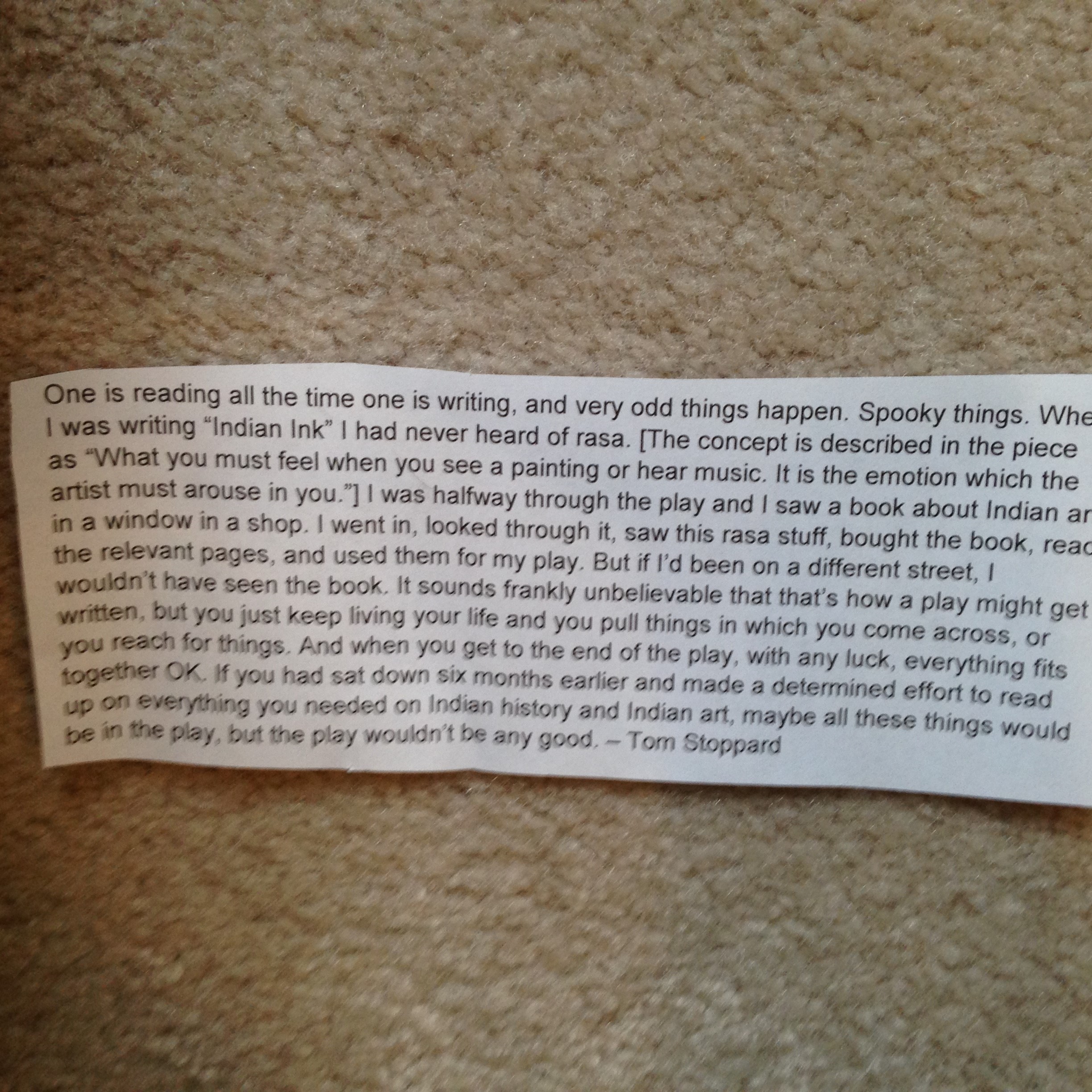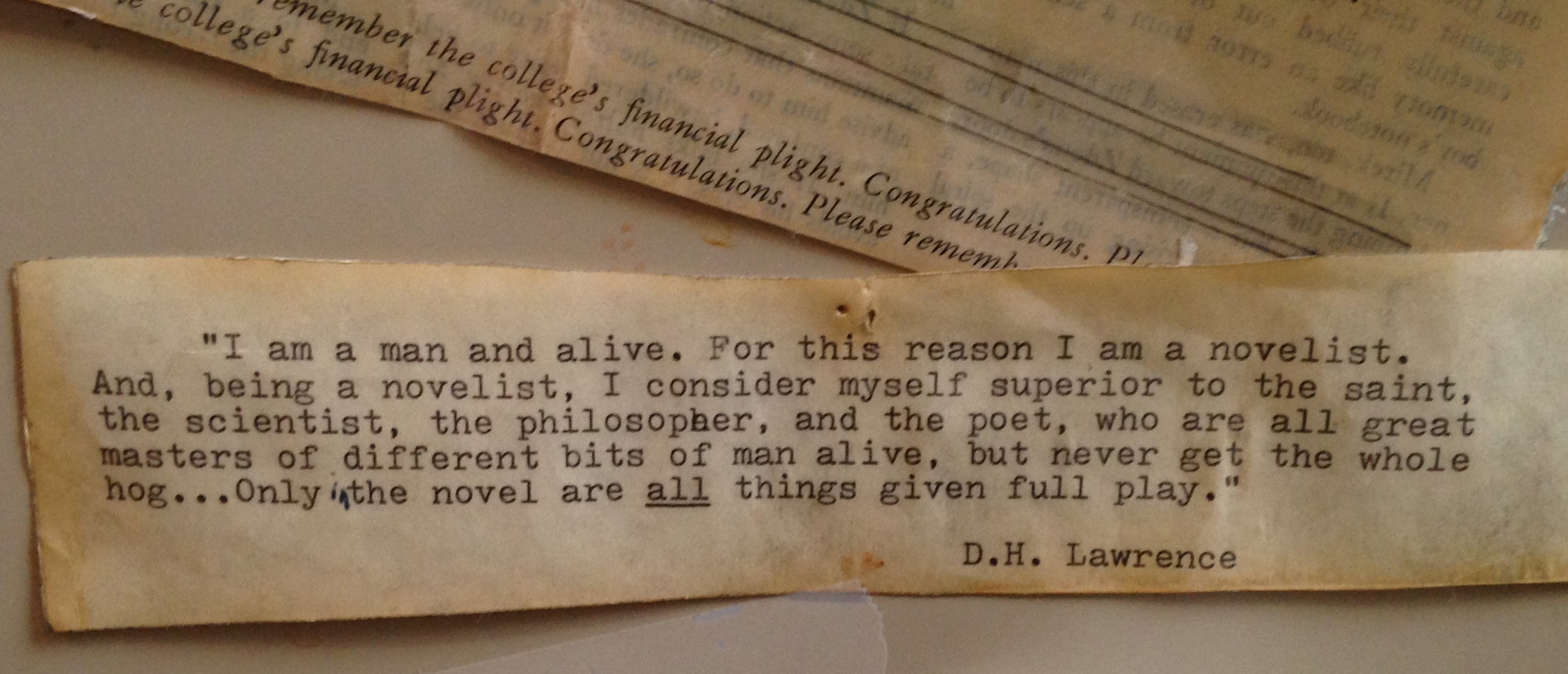WORDS TO WRITE BY
11/04/15 – WORDS TO WRITE BY
I knew a boy in high school who kept laminated copies of favorite quotations in his wallet. Impressed, I started collecting favorite quotes about writing and art and life myself, and pinned them near my desk as inspiration. I still have them. And, yeah, I realize I could just Google any and every quote on writing or anything else these days. But these are my own private curated collection, and before the paper yellows much more, I want to share a few words of wisdom I’ve kept at my side for a lifetime.
Here are few of my favorites quotations on being a writer and the process of writing itself. The first, from D.H. Lawrence, spoke so much to me in my youth that I used it in my college yearbook profile:
I am a man and alive. For this reason I am a novelist. And, being a novelist, I consider myself superior to the saint, the scientist, the philosopher, and the poet, who are all great masters of different bits of man alive, but never get the whole hog….Only the novel are all things given full play.
Pretentious maybe—but inspirational nonetheless. Besides, you have to be a bit, or more than a bit pretentious, to be a novelist, right?
Equally inspirational to me as a young writer were these words of Virginia Woolf’s from A Room of One’s Own:
…[W]here books are concerned, it is notoriously difficult to fix labels of merit in such a way that they do not come off. Are not reviews of current literature a perpetual illustration of the difficulty of judgment? ‘This great book,’ ‘this worthless book,’ the same book is called by both names. Praise and blame alike mean nothing. No, delightful as the pastime of measuring may be, it is the most futile of all occupations, and to submit to the decrees of the measures the most servile of attitudes. So long as you write what you wish to write, that is all that matters; and whe
ther it matters for ages or only for hours, nobody can say. But to sacrifice a hair of the head of your vision, a shade of its colour,, in deference to some Headmaster with a silver pot in his hand or to some professor with a measuring-rod up his sleeve, is the most abject treachery, and the sacrifice of wealth and chastity which used to be said to be the greatest of human disasters, a mere flea-bite in comparison.
Not surprisingly, this particularly perspective has become increasingly comforting as the decades continue to pass.
Others words of wisdom have encouraged me not only to keep writing but built my confidence about the way I was going about the whole business. This more recently acquired quotation from Tom Stoppard captures perfectly the serendipity that I have experienced often in the midst of creative projects:
One is reading all the time one is writing, and very odd things happen. Spooky things. When I was writing “Indian Ink” I had never heard of rasa. [The concept is described in the piece as “What you must feel when you see a painting or hear music. It is the emotion which the artist must arouse in you.”] I was halfway through the play and I saw a book about Indian art in a window in a shop. I went in, looked through it, saw this rasa stuff, bought the book, read the relevant pages, and used them for my play. But if I’d been on a different street, I wouldn’t have seen the book. It sounds frankly unbelievable that that’s how a play might get written, but you just keep living your life and you pull things in which you come across, or you reach for things. And when you get to the end of the play, with any luck, everything fits together OK. If you had sat down six months earlier and made a determined effort to read up on everything you needed on Indian history and Indian art, maybe all these things would be in the play, but the play wouldn’t be any good.
Speaking of luck and intuition, Ray Bradbury also had much to say about their value in writing—and, worth noting, he also kept inspirational signs by his desk, or so he once claimed in a Writer’s Digest interview:
The only good writing is intuiti
ve writing. It would be a big bore if you knew where it was going. It has to be exciting, instantaneous and it has to be a surprise. Then it all comes blurting out and it’s beautiful….I’ve had a sign by my typewriter for 25 years which reads, “DON’T THINK!’ I just act and react and emotionalize and all good stuff comes out. Nobody’s ever thought their way to anything in literature, even “big brains” like George Bernard Shaw. Go through some of his notes on how he did his plays. He gets his characters rolling and they begin to talk and they take over the play and write it for him. That’s not thinking with a capital T, it’s intuitive creation! It’s the life force finding its own root system and declaring itself.
This was a message I very much need to hear in my youth. And I need reminding about it to this day.
I’ll share some more in months to come.
Terra Ziporyn
TERRA ZIPORYN is an award-winning novelist, playwright, and science writer whose numerous popular health and medical publications include The New Harvard Guide to Women’s Health, Nameless Diseases, and Alternative Medicine for Dummies. Her novels include Do Not Go Gentle, The Bliss of Solitude, and Time’s Fool, which in 2008 was awarded first prize for historical fiction by the Maryland Writers Association. Terra has participated in both the Bread Loaf Writers Conference and the Old Chatham Writers Conference and for many years was a member of Theatre Building Chicago’s Writers Workshop (New Tuners). A former associate editor of the Journal of the American Medical Association (JAMA), she has a PhD in the history of science and medicine from the University of Chicago and a BA in both history and biology from Yale University, where she also studied playwriting with Ted Tally. Her latest novel, Permanent Makeup, is available in paperback and as a Kindle Select Book.
- Web |
- More Posts(106)
